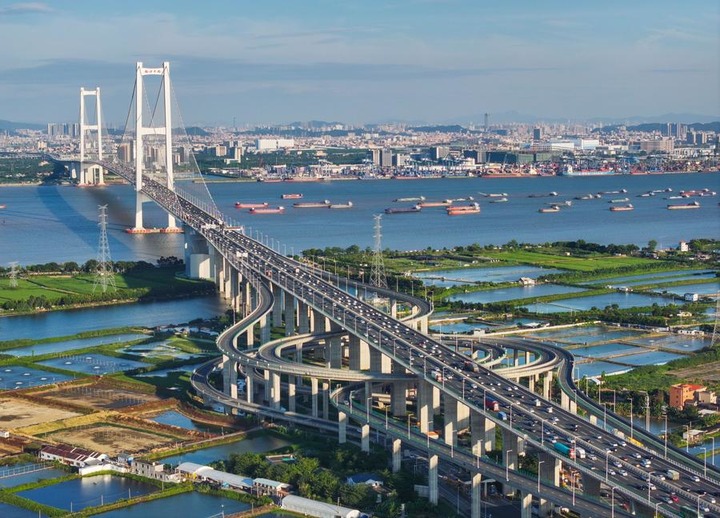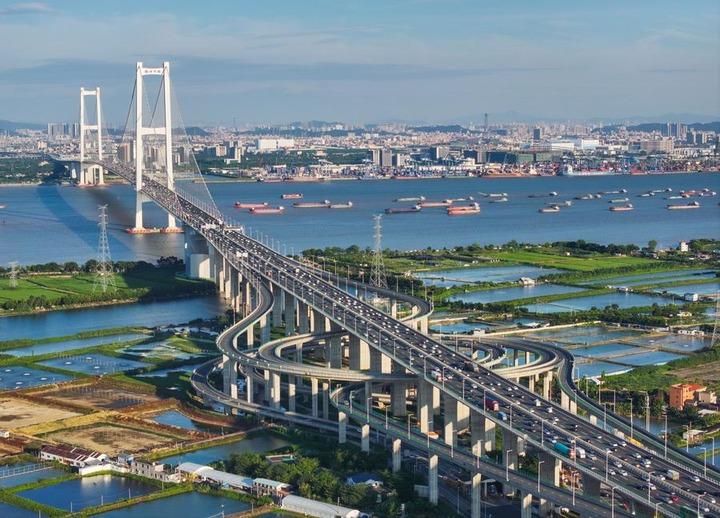
An aerial drone photo taken on Oct. 2, 2024 shows a view of the Nansha Bridge, which links Guangzhou City and Dongguan City, and ships along the Shiziyang channel in the Pearl River Estuary area, in south China's Guangdong Province. (Xinhua/Liu Dawei)
BEIJING, Feb. 28 (Xinhua) -- China has recently issued an action plan to stabilize foreign investment in 2025, which outlines concrete measures to solve keen concerns of foreign-invested enterprises, empowering them to invest in China and share China's development opportunities.
-- Equal participation in government procurement
The action plan calls for clarifying standards for the government procurement of domestic products, and for implementing measures to ensure that products manufactured by enterprises of different ownership types in China can participate equally in government procurement activities.
A key part of China's efforts to improve business environment is to ensure foreign-invested enterprises' national treatment, said Chinese Vice Commerce Minister and Deputy China International Trade Representative Ling Ji at a press conference, adding that China has always attached great significance to the equal participation in government procurement of foreign-invested enterprises.
China rolled out a guideline in July 2023, calling for clarifying the specific standards for "manufactured in China." Later in December 2024, China's finance ministry issued a circular on the standards for the government procurement of domestic products and related policy implementation to invite public opinion. The revision of the Government Procurement Law is also underway.
-- Strengthening IP protection
China's commitment to strengthening intellectual property (IP) protection is never a lip service. China's market regulation authorities have pushed forward the national pilot program on trade secret protection to protect foreign-invested enterprises, according to Zhou Weijun, an official with the country's State Administration for Market Regulation.
The national pilot program has made a great breakthrough as China's first "trade secret pledge loan window" was launched in Foshan Intellectual Property Protection Center in south China's Guangdong Province. The move is expected to further improve trade secret protection and utilization mechanisms, and deepen the "1+1" dual-drive model featuring trade secret pledge loan financing and trade secret insurance, which marks a new stage in trade secret protection.
China's efforts on IP protection have also been appreciated by foreign-invested enterprises. Data from China National Intellectual Property Administration showed that the country scored 80.55 out of 100 in terms of foreign enterprises' IP protection satisfaction in 2023, up 1.44 points from 2022. As of June 2024, foreign-invested enterprises held over 919,000 valid invention patents and about 2.13 million registered trademarks, up 3.9 percent and 3.8 percent, respectively.
-- Active role in standard setting and revision
Participation in China's standard setting and revision has also been among the keen concerns of foreign-invested enterprises. In fact, as early as 2017, China unveiled a guideline, which shed light on the subject, scope, patent protection, rights and obligations of foreign-invested enterprises participating in China's standardization work.
China's market regulation authorities strive to involve foreign-invested enterprises in the standardization process. On the one hand, it has been promoting information disclosure and transparency in the setting and revision of national standards, so that these enterprises can participate in the all-journey process including project initiation, drafting, request for comments and review, etc. On the other hand, the member backgrounds of the technical committees have been diversified and the application of membership is open to the whole society. By the end of 2024, members from foreign-invested enterprises had participated in 837 national standardization technical committees, accounting for 61 percent of the total number of technical committees.
Looking forward, more related policies will be introduced to expand the institutional opening up of standard setting. More foreign enterprises and experts are welcome to actively participate in standard setting and revision, said Zhou.
(Edited by Li Shimeng with Xinhua Silk Road, lishimeng@xinhua.org)




 A single purchase
A single purchase









